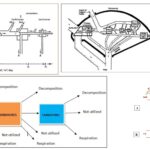the molecular mechanism of Potassium Homeostasis
the molecular mechanism of Potassium Homeostasis
Please login to submit an answer.
potassium homeostasis, it’s tightly regulated ’cause even small changes in extracellular K⁺ can mess up nerve impulses, heart rhythm, muscle contractions. normally, about 98% of potassium stays inside cells, mostly in muscle tissue, while only 2% exists in extracellular fluid. this steep gradient’s maintained mainly by the Na⁺/K⁺-ATPase pump, which actively pushes K⁺ into cells while removing Na⁺, using ATP. when potassium levels rise in blood (hyperkalemia), cells rapidly uptake excess K⁺ to prevent dangerous shifts in membrane potential. insulin, epinephrine (via β2-adrenergic receptors), and aldosterone all help stimulate this uptake by enhancing pump activity or increasing membrane permeability.
dietary potassium’s absorbed in small intestine and filtered in kidney’s glomerulus. the renal system then plays key role in excretion—especially distal nephron and collecting ducts. in cortical collecting tubule, principal cells secrete K⁺ through ROMK (renal outer medullary potassium) channels and BK (big potassium) channels. aldosterone increases Na⁺ reabsorption via ENaC, creating a negative luminal charge that drives K⁺ secretion through ROMK. when plasma K⁺ falls (hypokalemia), secretion’s reduced, and intercalated cells may reabsorb potassium.
cell buffering’s also critical. during acidosis, H⁺ enters cells and K⁺ exits to maintain electrochemical balance—leading to hyperkalemia. opposite happens in alkalosis. β2-agonists like salbutamol or insulin injections are used clinically to rapidly shift K⁺ back into cells during emergencies. long-term balance, though, depends on kidneys adjusting excretion based on intake, hormones, flow rate, and acid-base status. the system’s delicate—if any step fails, like in renal failure or aldosterone deficiency, potassium levels drift dangerously, affecting heart and neuromuscular function.
- Share on Facebook
- Share on Twitter
- Share on LinkedIn
Helpful: 0%




